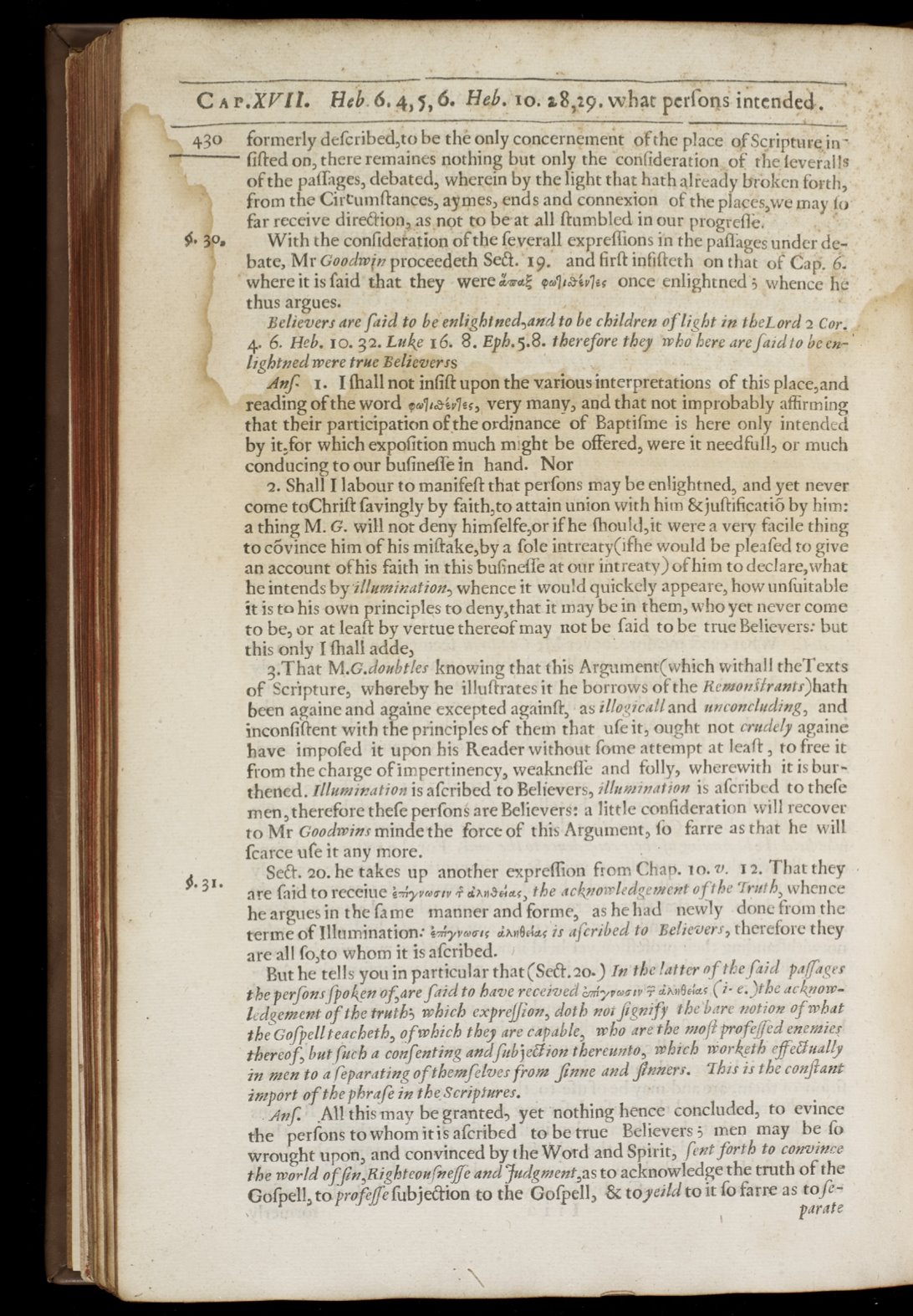

C
A
r.XVII.
,Heb.
6.
4, s,
6.
Heb.
io.
a8,q.
what
perfons
intended.
430 formerly defcribed,to be
the
only
concernemeut
ofthe
place
of
Scripture
in
fitted on,
there remaines nothing but
only
the
`confideration
of
the
leverai
is
of
the
paffages,
debated,
wherein by
the light
that
bath already broken forth,
from
the
Cireumftances, aymes, ends and connexion
of
the
places,we may to
far
receive direction,
as,not to
beat
all (tumbled
in
our
progreflè.
0.39.
With the
confiderati;ion
of
the feverall
expreflions
in
the
pafla'ges
under de-
)
bate, Mr
Goodwfn
proceedeth
Sect.
sg.
and
firft
infifteth on
that
of
Cap.
6.
where it
is Paid
that
they were
zra
¢wIraivies
once enlightned
;
whence he
thus
argues.
Believers are
Paid to
be
enlightned,and
to
be
children
of
light
in
tbeLord
z Cor.
4.
6. FIcb.
so.
32. Luke 16.
8.
Eph.
5.8.
therefore
they
who here
are
faid
to
be en
-'
lightned
were
true Believerss
Ant
s. I
(hall
not
infift
upon the variousinterpretations
of
this
place,and
reading
of
the word
,pw7i
Mules,,
very many,
and
that
not improbably
affirming
that their
participation
ofthe
ordinance
of
Baptifine
is
here only intended
by
it,for
which expofition much
might be
offered, were
it
needfull, or
much
conducing
to
our
bufineffe in
hand.
Nor
z. Shall
I labour
to
manifeft
that
perlons
may
be
enlightned, and
yet never
come toChrift
favingly by
faith,to attain
union with him &juttificatió by him:
a
thing
M.
G.
will
not
deny himfelfe,or
if
he fhould,it were
a
very
facile
thing
to
cóvince him
of
his
miftake,by
a
foie intreaty(ifhe would be
pleafed
to give
an account
of
his
faith in this
bufineffe
at
our
intreaty)
of
him
to declare,what
heintends by illumination,whence
it
would quickely appeare, how unfuitable
it
is
to
his
own
principles
to
deny,that it
may
be
in
them,
who yet never come
to
be, or at
leaft by
vertue
thereof
may
not
be
faid
to
be true
Believers:
but
this only
I
thall
ankle,
3.That
M.G.doubtles
knowing
that
this
Argument(which withalí
theTexts
of
Scripture, whereby
he illuttrates
it
he
borrows
of
the
Remon.ilrants)bath
been
againe
and
againe excepted againft,
as illogical!
and
unconcluding,
and
inconfiftent
with the
principles
of
them
that
ufe
it,
ought
not
crudely
againè
have impofed
it
upon
his
Reader
without
fomne
attempt
at
leaf,
to
free
it
from the charge
of
impertinency,
weaknefle and
folly,
wherewith it
is
bur
-
thened.
Illumination
is
afcribed
to
Believers, illumination
is
afcribed
to
thefe
men,
therefore thefe
perfons are Believers:
a
little confderation
will
recover
to
Mr
Goodwins
minde
the
force
of
this Argument,
fo
farte
as
that
he will
fcarce ufe
it
any
more.
3
Sect.
zo. he
takes
up
another
expreffion from Chap.
s
o. v. 12.
That
they
Sl.
ate
faid
to
receive
i
4vw0ry
t
drnsslas,
the
acknowledgement
ofthe
Truth,
whence
he argues
in
the
fame
manner and forme,
as
he had newly done
from
the
terme
of
Illumination:
«yvnQrs
árnksas is
afcribed
to
Believers,
therefore they
are
all
fo,to
whom it
is
afcribed.
Buthe tells you
in
particular
that
(Se
&.zo.)
In
the latter
ofthefaid
pa/fager
the
perfons
fpokenof,are
faid
to have received
yvaaiv
r
drnh
has
(i-
e.)the
acknow-
ledgement
of
the
truth;
which
exprefìon,
Both
not
figni
fy
the bare notion
of
what
the
Gofpell
teacheth,
o
fwhich
they
are capable,
who are
the
mo
/l
pro
feted
enemies
thereof, butfuch a
confenting
and
fsbjeClion thereunto, which
voorketh
efelJually
in
men to a
feparating ofthemfelvesfrom
finne
and
'Inners.
This is the confiant
import
of
the phrafe in the
Scriptures.
.
Anf
All this
may be
granted, yet
nothing
hence concluded,
to
evince
the
perfons
to
whom
it
is
afcribed
to
be
true
Believers;
men may
be
fo
wrought upon,
and convinced by
the Word
and Spirit, tent forth
to convince
the
world offin,Righteoufnefè
and7udgment,as
to
acknowledge
the
truth
of
the
Gofpell,
to
profefe
fubje
&ion
to
the
Gofpell, & toyeild
to
it
fo
farce
as
tofe-
parate










